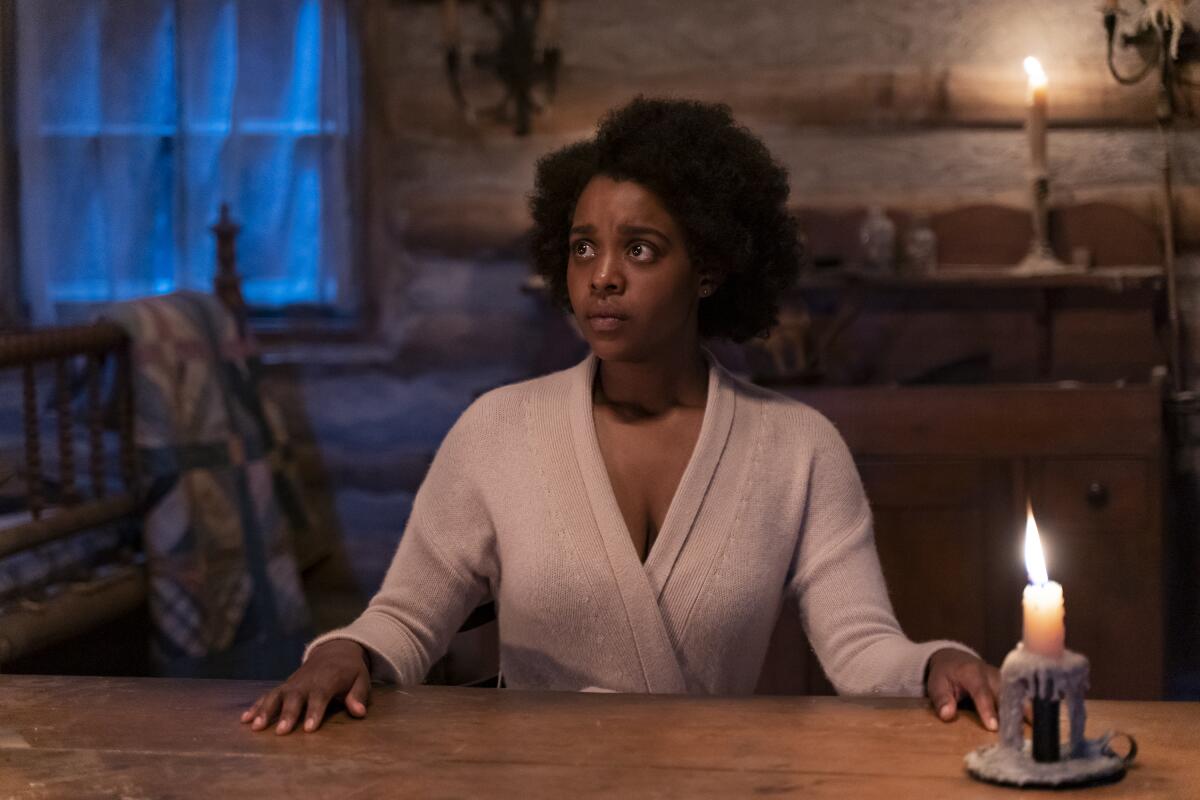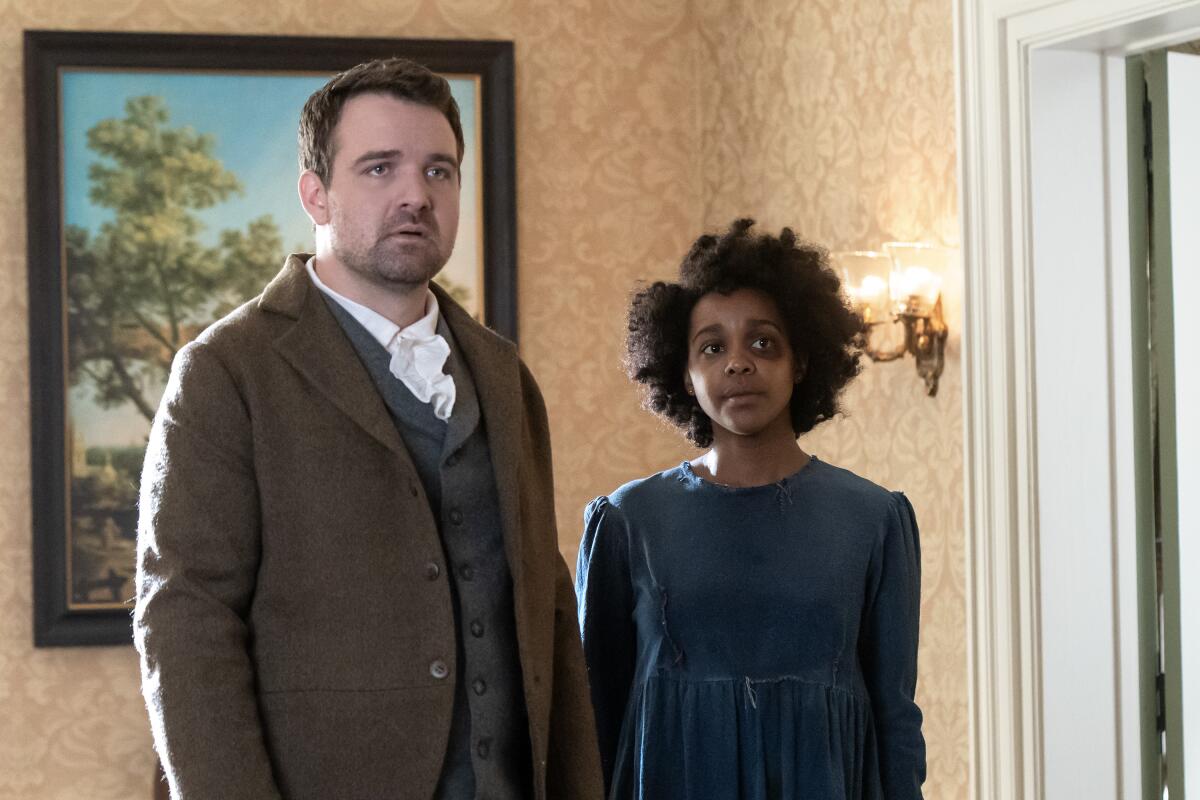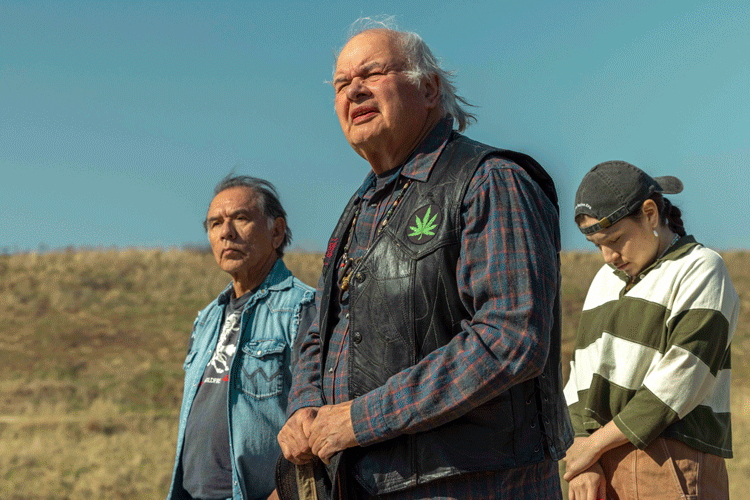‘Kindred’s’ transfer to TV keeps the novel’s plot intact, but loses its spirit

- Share via
Sixteen years after her premature death, Octavia Butler is having a moment. As one of the first Black women to write science fiction, Butler has been celebrated and studied for a long time, but she has lately come into wider view. Her 1993 novel “Parable of the Sower” jumped onto the New York Times bestseller list in 2020, and in the Hollywood spirit of “Get me one of those,” several of her works have been optioned for development. The first of these to appear is “Kindred,” whose eight-episode first season premieres in its entirety Tuesday on Hulu.
Published in 1979 and set by turns in the bicentennial year and the early to mid-1800s, the novel is not science fiction per se; although it involves time travel, it is inexplicable in any but metaphysical terms. (Butler described it as a “grim fantasy.”) Developed by playwright Branden Jacobs-Jenkins, the series, relocated from 1976 to the present day — 2016 is the pre-pandemic named year — adopts Butler’s main mechanism and her main characters and incidents, with some alterations. It remains a story about a Black woman from the 21st century who finds herself on a plantation in the 19th.
But in order to turn a fairly compact book into a series — not a limited series, either, but one that will require at least a second season to encompass its events — it has been built out with additional characters, events and subplots that feel crafted to provide drama and sensation and to make its heroine more actively and conventionally heroic. (With the upshot that she is also less contemplative.) So while “Kindred” works fairly well as a righteous historical melodrama, much of what makes the novel interesting — its psychological insights, its thoughtfulness — is dissipated or obscured by the adaptation’s length and busyness. (If you’re interested in the series and haven’t read the book, you’ll be better off watching first, reading later.) Whatever its merits, it runs too far afield of the original text to qualify as a successful translation.
What it has inarguably in its favor is a strong central performance by Mallori Johnson, at the beginning of what should be a long and fruitful career. Johnson plays Dana, who, as the series begins, has moved to Los Angeles with hopes of writing for television. (Butler’s original Dana is an aspiring author of novels and short stories.) Jacobs-Jenkins has given her an uncle (Charles Parnell), an ex-cop, and aunt (Eisa Davis), a nurse, who will be involved in Dana’s much-expanded contemporary adventures. Less profitably, she also gets an annoying, nosy neighbor, played by Brooke Bloom, a lampoon of white liberal concern.
We surveyed The Times’ TV team to come up with a list of the 75 best TV shows you can watch on Hulu.
After a difficult dinner with her relations, Dana accepts a ride home from Kevin (Micah Stock), their waiter, who is white, which gives us an opportunity to see not only that he’s a decent guy but that he knows his soul music. (He is also a musician, or was.)
Dana coincidentally finds Kevin again on a dating app, and after they have slept together and watched an episode of “Dynasty” in her still-unfurnished new home — the clip has a thematic resonance with things to come — Dana suddenly disappears from 21st century L.A. to find herself in what she will eventually learn is a plantation in 19th century Maryland. She discovers a baby turned face down in a crib, turns him on his back. Then, encountering her own mother, Olivia (Sheria Irving), who she had believed long dead, Dana is frightened back into her own time. Was it a dream? She thinks so at first. But it happens again; she saves the same child — now older — from drowning, and finding herself at the end of a gun, disappears again into her own time.

The child is Rufus (David Alexander Kaplan), the son of slave-holding plantation owner Tom Weylin (Ryan Kwanten) and his wife Margaret (Gayle Rankin), and it may become clear to you before it does to Dana that she is pulled back in time whenever Rufus’ life is in danger and returns to the present when she believes she will die herself. Though she might be in the past for days or months, she is never gone from her own world for more than seconds, minutes or hours. As in the novel, Dana and Rufus turn out to be historically intertwined, with whatever forces are animating this strange relationship safeguarding her existence as well as his. It’s the sci-fi trope of protecting the present by regulating the past and basic to the novel’s theme that any life is the product of a complicated chain of events, that our happy circumstances might be built on someone else’s pain — a good metaphor for slavery in the bargain.
It turns out that whatever is touching Dana when she slips through time makes the trip with her, and so at one juncture Kevin finds himself in the antebellum past as well. In the book, Dana and Kevin are married and know each other well; here they are starting up a romance under strange and stressful conditions in a world that treats them as differently as might be imagined. “If you can somehow shut out the fact that this whole thing is happening in a terrifying and horrible place, it’s kind of like a retreat,” Kevin will say early on, and Dana seems to agree. Later, she will be less sanguine. (“You’re not seeing what I see every day.” “I know that.” “Do you?”)
The complete guide to home viewing
Get Screen Gab for everything about the TV shows and streaming movies everyone’s talking about.
You may occasionally receive promotional content from the Los Angeles Times.
It’s difficult, not to say demented, even depraved, to form a “nuanced” view of slavery in this more (if not completely) enlightened time — though there are those who try — and as in the novel, “Kindred” does not scant the atrocities of humans treating other humans as property. But Butler’s novel is also an investigation of character within context and “how easily people could be trained to accept slavery,” as Dana observes — written, Butler told interviewer Randall Kenan, “as a reaction to some of the things going on during the ‘60s, when people were feeling ashamed of, or more strongly, angry with their parents for not having improved things faster.” And the series, which invests in the sort of drama believed necessary to power a television show through one season and onto the next, does not catch this subtler aspect.
It doesn’t help that the white Southerners come off as cartoons, speaking theatrical dialogue, with their most villainous aspects writ large; they are too easy to dismiss. (For that matter, few of the Black characters, including Austin Smith as slave-in-charge Luke; Sophina Brown as Sarah, who runs the cookhouse; Lindsey Blackwell as her mute daughter, Carrie; and Christopher Farrar as Rufus’ playmate Nigel, are much developed either.) Tom is a lout and a schemer, quick to violence, who has been made something of a homophobe for good measure (he is keen to any sort of “feminine” behavior in men), and though he believes he’s giving his slaves “safety, protection,” he treats them as disposable when it suits him. Margaret is high-strung, bordering on hysterical, and territorial when it comes to her child, who seems to prefer the company of Dana.
Time is literally of the essence in the novel, whose 19th century timeline takes place over two decades. Rufus is the key to this cosmic mystery, which turns not just on Dana keeping him alive, but on her hopes of turning him into a better man than his father — one who might even free his slaves. But because we see him this season only as a child, and Kaplan represents the character without really inhabiting it, the question of change, or the lack of it, will be punted to next season. This may work for the business plan, but it does the story, and the viewer, a disservice.
‘Kindred’
Where: Hulu
When: Any time
Rating: TV-MA (may be unsuitable for children under the age of 17 with advisories for violence, sex and coarse language)
More to Read
The complete guide to home viewing
Get Screen Gab for everything about the TV shows and streaming movies everyone’s talking about.
You may occasionally receive promotional content from the Los Angeles Times.








